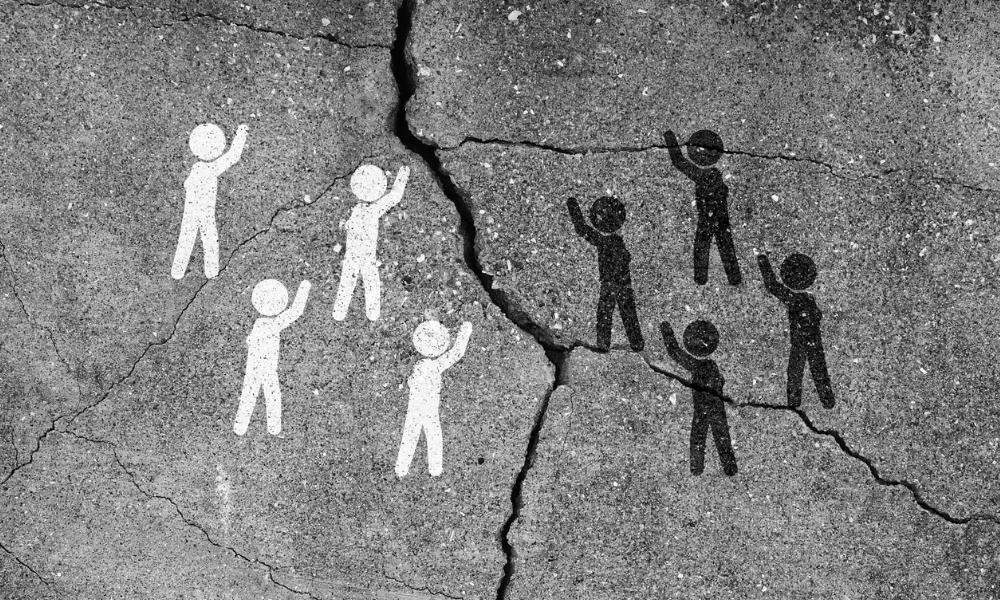
'Addressing inequity and its impacts requires a commitment to understanding the system in which BIPOC navigate their careers'

Black, Indigenous and other peoples of colour (BIPOC) in Canada see racial discrimination as a barrier to a successful career, according to a recent report.
Among BIPOC workers, 20% see racial identity as a barrier to career growth, finds a study from the Coalition of Innovation Leaders Against Racism (CILAR). Another 35% suspect this, but are not certain.
In comparison, the comparable figures are just 10% and 12%, respectively, among their white managers.
“BIPOC Canadians are twice as likely to feel that their racial identity has held back career growth as their white managers,” says CILAR in the report. “This is highest among BIPOC Canadians aged 45-59, those living in urban environments and those who are part of a public sector union.”
Nearly a third (29%) of BIPOC workers aged 45-59 see racial identity as a barrier to career growth, compared with 20% among 30- to 44-year-olds, 18% among 18- to 29-year-olds and 13% among those aged 60 and up.
BIPOC workers are also twice as likely than their white managers to feel unwelcome in the workplace.
Twenty-two percent of BIPOC workers have this claim and 25% suspect the same, while the comparable for their white managers are far lower at 12% and 10%, respectively.
BIPOC workers aged 30 to 44 (31%) and 45 to 59 (24%) are more likely compared with 18- to 29-year-olds (19%) and 60-year-olds or older (5%) to have this feeling.
Under-represented workers are also far more likely to have experienced the following:
|
Scenario |
BIPOC |
White Managers |
||
|
Yes |
Suspects so, but uncertain |
Yes |
Suspects so, but uncertain |
|
|
Feel excluded from professional development because of their racial identity |
23% |
18% |
10% |
13% |
|
Have been judged harshly because of their racial identity |
26% |
22% |
9% |
11% |
|
Have been assigned tasks at work specifically due to their racial identity. |
22% |
14% |
6% |
10% |
|
Find it challenging to find mentorship and/or sponsors |
17% |
19% |
7% |
12% |
|
Have been called a racial slur at work |
16% |
10% |
12% |
9% |
Under-represented groups need more than upskilling and training, according to a previous report.
Despite these numbers, just 8% of BIPOC workers have reported situations where racial identity is a factor, compared with 9% among their white managers, based on CILAR’s survey of 400 BIPOC workers and 100 white managers.
“Although BIPOC Canadians do not significantly differ from white managers in their experience reporting situations where racial identity is a factor, they do experience 0.5 more incidences on average,” says CILAR “Incidence is highest among BIPOC members of public sector unions (with 18% having reported an incident).”
And BIPOC Canadians are over 10% more likely to have been prompted to leave their company due to racial discrimination: 6% compared with 4% among their white managers.
Nearly six in 10 (58.6%) of Indigenous workers have experienced discrimination in their current workplace, according to a previous ComIT.org report.
Addressing inequity and its impacts requires a commitment to understanding the system in which BIPOC navigate their careers, says Jodi Tingling, founder of Creating New Steps – which offers customized training and self-paced digital workshops – via CERIC.
“Your strategy to empower BIPOC’s career trajectory needs to begin with commitment to becoming an ally to support and dismantle a system that serves as a disadvantage to the BIPOC community. This requires challenging the system and providing a space for BIPOC to thrive in their careers,” she says.
Here are some strategies that you can start to engage in to advocate for opportunities for the BIPOC community, she says: